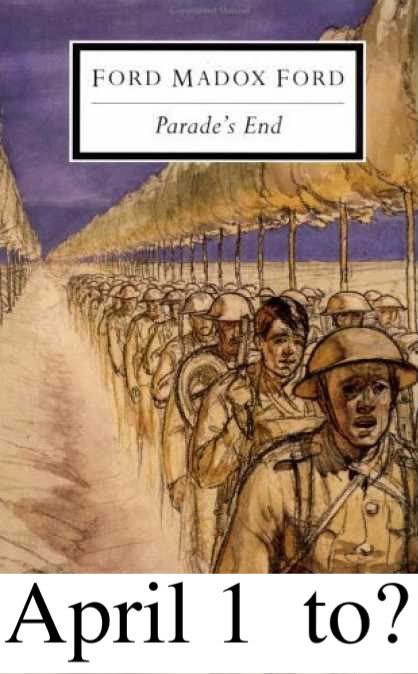Is Parade's End an Encyclopedic Narrative? -a question for readers-
Conspiracy of Commodities: Postmodern Encyclopedic Narrative and Crowdedness Alan Clinton
[1] In 1976, Edward Mendelson used the novel Gravity's Rainbow in order to introduce a genre that had "never previously been identified"(161), the "encyclopedic narrative." A cynical reading of his essay (published in a volume on Thomas Pynchon entitled Mindful Pleasures) would view the new genre as Mendelson's excuse to glorify his favorite novelist, for his definition of "encyclopedic authors" is extremely exclusive: Dante, Rabelais, Cervantes, Goethe, Melville, Joyce, and of course, Pynchon. Yet, Mendelson does provide a set of criteria for encyclopedic narratives which extends beyond their exceptional authors: 1) they all include an extensive account of at least one technology or science; 2) they are an encyclodedia of literary styles; 3) they all provide a history of language (are metalinguistic); 4) they all propose a theory of social organization. From
In a very famous and still highly regarded early essay on Gravity's Rainbow by Thomas Pynchon, Professor Edward Mendelson (Columbia University) coined the term "Encyclopedic Narrative" as given an informative name to what he said were seven master literary works of western civilization. (listed in the quote above)-All these works sort of sum up a culture at its apex. I know this concept is very useful in unraveling the mysteries of Gravity's Rainbow. One of the incidental characteristics of an encyclopedic narrative is simply that it is a long book. I began to wonder if maybe Mendleson had overlooked a very obvious encyclopedic narrative. Most of the narratives are also about a culture in decline or at its apex. Parade's End does use a variety of literary styles (not as wide a variety as Gravity's Rainbow maybe but as wide a variety as would be credible in the structure of the work). It also makes reference to ancient literature and makes wide use of slang of an era just like Moby Dick uses whaling slang. The extensive literary references can maybe be seen as part of a metalinguistic theory. The lead character is both a man of extensive literary culture (some of which he has wrong-this is no accident of course) and a skilled statistician and versed in higher mathematics. Parade's End does show us Tietjens explaining these functions in his various conversations. There are a lot of obscure references in Parade's End just like in Gravity's Rainbow and Moby Dick. Also do not forget one of the hobbies of our lead character is correcting the Encyclopedia Britannica. There are extensive comments about the structure and nature of society in Parade's End also. Parade's End is for sure a book about social structure and class construction through artifacts and literature.
My question to readers of Parade's End is then should the work be treated as an encyclopedic narrative of England in the 1910s? Parade's End seems to be many things. One of its deeper themes seems to me to be the nature of culture and deeper still the nature of knowledge.
Parade's End is also fun. The conversations are marvelous and the relationships of the characters are really interesting. Even the 3rd party style narrator is really a character in the story. I will say it is not a work that you should lollipop your way through. As you can see I am quite baldheaded over it and do run to the magpie on its marvels. (ok no more slang from the 1910s!)





3 comments:
With my limited understanding of the concept and given how far I am in the book (just starting Chapter 3 of Part Two), I don’t see the work as an encyclopedic narrative. Instead I see it as a series of conflicts: conscious vs. unconscious, old vs. modern, memory vs. history, etc. There is a comment at the beginning of Chapter 3, Part Two that made things ‘click’ for me on that point, where Christopher recalls an image of his brother Mark, one that probably never occurred. Yet that is how Christopher sees him. Paralleling your comment on the book being about the nature of knowledge is the nature of memory. Many literary quotes/references are used, but moreso in helping to trigger conflict than anything else (such as Sylvia's response to Christina Rossetti's poem). Whether or not that still makes it fall in the category of encyclopedic narrative, I don’t know.
Were this one work instead of four, I would say that Ford is using the opening of the Parade’s End as a lesson on how to read the rest of the work. Instead, based on what little I know about the remaining books (so take this with a truckload of salt), I would guess that Ford is still learning how to narrate inner dialogues, moving from scene-based descriptions to inner thoughts. He can dramatize these processes marvelously, but he seems to be figuring out how to move toward a narrator-less (or whatever that term should be) basis.
What I didn't make clear in my previous comment is that my take does not exclude Parade's End from being an encyclopedic narrative, but what that definition focuses on are things I don't see as important as the items I mentioned...again, mileage may vary...
I don't know how to answer this question either, but I understand why you asked - there's just so much stuff here. So much more than in The Good Soldier or - what were some contemporary books? - A Passage to India or Mrs. Dalloway. Probably not more stuff than Ulysses - close, though.
Post a Comment